
The 4th century was the time period which lasted from 301 to 400. In the West, the early part of the century was shaped by Constantine the Great, who became the first Roman emperor to adopt Christianity. Gaining sole reign of the empire, he is also noted for re-establishing a single imperial capital, choosing the site of ancient Byzantium in 330 to build the city soon called Nova Roma ; it was later renamed Constantinople in his honor.
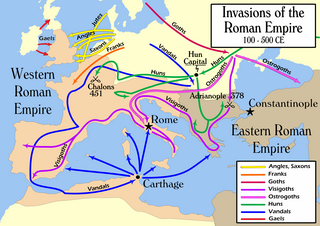
The Migration Period was a period that lasted from AD 375 to 568, during which there were widespread invasions of peoples within or into Europe, during and after the decline of the Western Roman Empire, mostly into Roman territory, notably the Germanic tribes and the Huns. This period has also been termed in English by the German loanword Völkerwanderung and—from the Roman and Greek perspective—the Barbarian Invasions. Many of the migrations were movements of Germanic, Hunnic, Slavic and other peoples into the territory of the then declining Roman Empire, with or without accompanying invasions or war.

The Gepids were an East Germanic tribe. They were closely related to, or a subdivision of, the Goths.
Kara-Tur is a fantasy world created by David Cook which first appeared in the Oriental Adventures rulebook for the first edition of the Advanced Dungeons & Dragons role-playing game in 1986. Kara-Tur's cultures and peoples are fantasy analogues of medieval China, Korea, Japan, the Ryukyu Islands, Tibet, and other regions of East Asia. In 1987, Kara-Tur was placed on the same fictional world as the Forgotten Realms campaign setting.
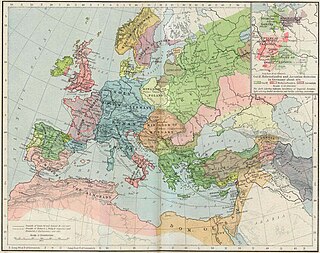
The High Middle Ages, or High Medieval Period, was the period of European history that commenced around 1000 and lasted until around 1300. The High Middle Ages were preceded by the Early Middle Ages and were followed by the Late Middle Ages, which ended around 1500.

Total War is a series of strategy games developed by The Creative Assembly for personal computers. They combine turn-based strategy and resource management with real-time tactical control of battles. The first of the series, Shogun: Total War was released in June 2000. The most recent major game released was Total War: Three Kingdoms on 23 May 2019. The series has sold over 20 million copies.
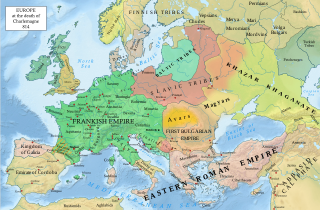
Historians typically regard the Early Middle Ages or Early Medieval Period, sometimes referred to as the Dark Ages, as lasting from the 5th or 6th century to the 10th century. They marked the start of the Middle Ages of European history. The alternative term "Late Antiquity" emphasizes elements of continuity with the Roman Empire, while "Early Middle Ages" is used to emphasize developments characteristic of the earlier medieval period. As such the concept overlaps with Late Antiquity, following the decline of the Western Roman Empire, and precedes the High Middle Ages.

Medieval: Total War is a turn-based strategy and real-time tactics computer game developed by Creative Assembly and published by Activision. Set in the Middle Ages, it is the second game in the Total War series, following on from the 2000 title Shogun: Total War. Originally announced in August 2001, the game was released in North America on 19 August 2002 and in Europe on 30 August for Microsoft Windows.
NEXUS: The Kingdom of the Winds, alternately known as Nexus TK or simply Nexus, is a pay to play MMORPG, currently run in the US by Kru Interactive. Nexus began as a U.S. version of the Korean game 바람의 나라 developed by NEXON Inc. of Korea, and is loosely based on Korean mythology and on a series of graphic novels by an artist named Kim Jin. Development of Baram began in Korea in 1994 and the game was released on April 5, 1996. One year later, it also entered beta in the United States, going commercial in 1998. In 2005, the US subsidiary of NEXON changed its name to Kru Interactive and took over running Nexus, Dark Ages, and Shattered Galaxy as an independent company. Most of the employees of the subsidiary were laid off but the management remained the same as it was when the company was a subsidiary of NEXON.

Paradox Interactive AB is a Swedish video game publisher based in Stockholm. The company started out as the video game division of Target Games and then Paradox Entertainment before being spun out into an independent company in 2004. Through a combination of founding new studios and purchasing independent developers, the company has grown to comprise six first-party development studios, including their flagship Paradox Development Studio, and also acts as publisher for games from other developers.
Anglo-Saxon England was early medieval England, existing from the 5th to the 11th centuries from the end of Roman Britain until the Norman conquest in 1066. It consisted of various Anglo-Saxon kingdoms until 927 when it was united as the Kingdom of England by King Æthelstan. It became part of the short-lived North Sea Empire of Cnut the Great, a personal union between England, Denmark and Norway in the 11th century.

Rome: Total Realism is a complete modification pack originally created by the Total War Center user GaiusJulius for the computer game Rome: Total War, intended to rectify historical inaccuracies in the original game. The mod has been featured in several major gaming sites and magazines, such as PC Gamer (US), PC Gamer UK, and GameSpot. Recent versions of RTR include Rome: Total Realism VII : Grand Campaign, which uses the newer Barbarian Invasion engine. The mod further improves historical accuracy and introduces new game-play concepts. The last RTR VII series patch was released in 2012.
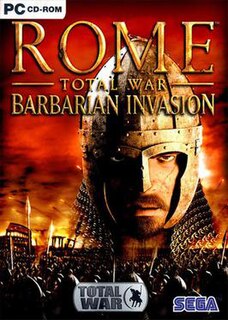
Rome: Total War: Barbarian Invasion is the first expansion pack for the strategy video game Rome: Total War. The expansion was released in 2005 in North America and Europe and in 2006 in Japan for Microsoft Windows. Feral Interactive released the iPad version on March 28, 2017, and the iPhone version on May 9, 2019. The Android version of the game, also by Feral Interactive, was released on June 18, 2019. While the main game deals with the rise of the Roman Empire, Barbarian Invasion covers the decline and fall of the Western Roman Empire during the Migration Period.
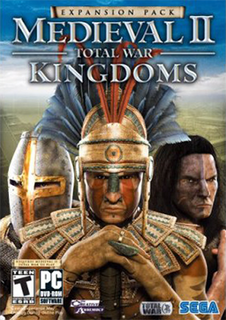
Medieval II: Total War Kingdoms is the expansion to the 2006 turn-based strategy PC game Medieval II: Total War. It was developed by Creative Assembly. The expansion was released on 28 August 2007 in North America and has four new campaigns: the first wave of European colonization of the Americas, the series of wars fought on British Isles during the 13th century, the Third and Fourth Crusades, and the Northern Crusades.
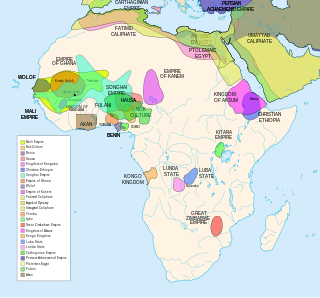
African empires is an umbrella term used in African studies to refer to a number of pre-colonial African kingdoms in Africa with multinational structures incorporating various populations and polities into a single entity, usually through conquest.
Rhye's and Fall of Civilization (RFC) is a "fan scenario" (mod) for the 2005 computer game Sid Meier's Civilization IV. It is an 'Earth simulator' that uses a variety of scripted events to mirror history much more closely than a typical game of Civilization. The name of the scenario references its core feature—the dynamic "Rise and Fall" of civilizations through time—and its creator, Gabriele Trovato, known as "Rhye" in the forums community.
Avadon: The Black Fortress is a single-player role-playing video game developed by Spiderweb Software. It is the first game in the Avadon trilogy. The game was released for Mac OS X in February 2011, and for Microsoft Windows in May 2011. Version for the iPad has been released on June 18, 2011. It was later also released for Android and Linux in order to be included in the Humble Bundle for Android 2.

Total War: Attila is a strategy video game developed by The Creative Assembly and published by Sega, released on 17 February 2015 for Microsoft Windows, OS X, and Linux. It is the ninth standalone game in the Total War series of video games.

The barbarian kingdoms were kingdoms dominated by northern European tribes established all over the Mediterranean after Barbarian Invasions from late antiquity to the early middle ages. The barbarian has been commonly used by historians to describe wild, uncivilized and uncultured groups that brought backwardness and ignorance to Europe. Other terms used include "Northern European kingdoms", "Romano-northern European kingdoms", and "post-Roman kingdoms".












